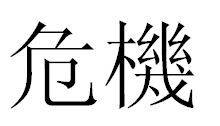
Tornou-se um lugar comum dizer que o tempo de crise também representa oportunidade, tomando como referência a palavra chinesa para crise: weiji (危機), que segundo essa percepção representaria a junção dos caracteres "perigo" e "oportunidade". Porém, dizem os entendidos, estamos perante não apenas um wishful thought, mas também um equívoco. Atentemos no que explica o Sinólogo Victor H. Mair:
"The third, and fatal, misapprehension is the author's definition of jī as "opportunity." While it is true that wēijīwēi syllable of wēijī does convey the notion of "danger," the jī syllable of wēijī most definitely does not signify "opportunity (...) The jī of wēijī, in fact, means something like "incipient moment; crucial point (when something begins or changes)." Thus, a wēijī is indeed a genuine crisis, a dangerous moment, a time when things start to go awry. A wēijī indicates a perilous situation when one should be especially wary. It is not a juncture when one goes looking for advantages and benefits. In a crisis, one wants above all to save one's skin and neck! Any would-be guru who advocates opportunism in the face of crisis should be run out of town on a rail, for his / her advice will only compound the danger of the crisis". does indeed mean "crisis" and that the
P.S. Cheguei aqui através do Shanghai Express, um dos melhores blogues em castelhano sobre a China (agora infelizmente bastente menos activo).

No comments:
Post a Comment